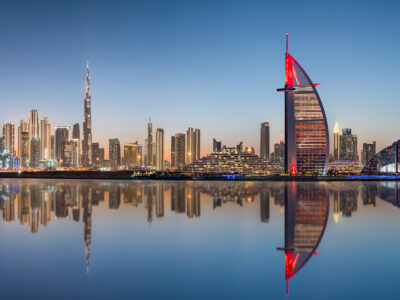Entrants to special economic zones being developed in Saudi Arabia will have access to the largest market in the GCC, giving the kingdom a competitive advantage over other free zones where incentives, including allowing 100 percent foreign ownership, look similar.
Special economic zones, or economic free zones, have emerged in the GCC as a way to attract foreign direct investment, and where other Gulf nations have established many – with over 40 in the UAE alone – Saudi Arabia is now establishing its first free zone and has this year delineated initial regulations for companies looking to set-up shop in the Integrated Logistics Bonded Zone (ILBZ), located near the international airport in Riyadh. There are around 20 free zones in the works in the kingdom.
“The advantage would be Saudi is a bigger market, even if you’re just servicing the domestic market,” Ibrahim Siddiki, a partner at Bracewell LLP law firm, told Arabian Business.
Saudi Arabia’s population of nearly 35 million dwarfs the other GCC states, where the United Arab Emirates is the second largest with nearly 10m inhabitants.
At home, the free zone will likely boost Saudi employment as well as attract more foreign nationals. The national unemployment rate is at 11.3 percent, though it fell to its lowest in a decade this quarter. Job creation remains one of the kingdom’s biggest challenges as it reshapes its oil-dependent economy. There are no public estimates about how many jobs the ILBZ will create, but Jebel Ali Free Zone – Dubai’s flagship entity – boasts that it sustains more than 135,000 jobs.
Non-oil economies
Free zones in the GCC thrive on schadenfreude as the Gulf countries actively look to create jobs for locals and diversify their economies, moving away from oil and boosting the contribution that non-oil sectors – tourism, hospitality and the private sector – make to their economies.
Efforts in Saudi Arabia, Oman and Bahrain are underway to make tourism a bigger contributing factor to national gross domestic product and boost national employment. Separately, Oman and Bahrain host their own free zones.
![]() Jebel Ali Free Zone in Dubai sustains more than 135,000 jobs.
Jebel Ali Free Zone in Dubai sustains more than 135,000 jobs.
Traditionally, Saudi Arabia has been one of the less friendly GCC markets to tap into, but efforts are underway to cut red tape and reduce bureaucratic proceedings.
Restrictions have eased in the past few years, and the new free zone is set to make doing business in the country easier, attracting foreign investment and incentivising companies to potentially move to Saudi Arabia, Scott Cairns, founder and managing director of Creation Business Consultants, previously wrote for Arabian Business.
The kingdom’s ease of doing business rating was 62 out of 190 in 2019 after jumping 30 spots, according to the World Bank. The UAE stands in 16th place, leading the region.
Similar to the UAE, Saudi Arabia has offered up a 50-year tax exemption for companies registered in the special economic zone.
“You’re getting exemptions from a lot of these costs… whether they’re direct or indirect taxes, like the customs [fees] or the VAT (value-added tax), and you’re going to benefit from that for 50 years,” Siddiki said.
![]() Ibrahim Siddiki, a partner at Bracewell LLP.
Ibrahim Siddiki, a partner at Bracewell LLP.
E-waste
In the ILBZ, activities ranging from maintenance and repair; sorting, packaging and distribution; import, export and re-export; logistics; to waste and e-waste recycling, will be eligible for tax and customs incentives.
“Recycling waste and e-waste is an interesting addition, because it’s different than the other activities that [focus on] logistics and transportation time, exporting and re-exporting,” Siddiki said.
On e-waste alone, the kingdom generated 533 kilotons in 2018 – the highest in the region – but the country lacks a framework for managing the batteries, phones, computers and other electronics that are tossed out that ultimately harm the environment, according to a 2019 paper published on the US National Centre for Biotechnology Information.
In the GCC, e-waste grows by 3-5 percent annually, meaning business opportunities are rife. Barring Saudi-specific stats, the GCC poses a $6bn general recycling opportunity.
![]() In the GCC, e-waste grows by 3-5 percent annually, meaning business opportunities are rife.
In the GCC, e-waste grows by 3-5 percent annually, meaning business opportunities are rife.
Increasing recycling rates in the GCC to 40 percent would create up to 50,000 new jobs, according to PwC analysis.
“Investors in this sector can expect healthy operating margins of above 15 percent in various opportunities across the value chain, such as waste electrical and electronic equipment recycling, plastics and packaging recycling, secondary metal semi-finished producers, or car spare parts manufacturing using recycled plastics,” the analysis read.
Hesitation fading
Hurdles have fuelled historical hesitation for potential investors in Saudi Arabia.
“There’s a lot of rules and regulations,” Siddiki said. “It has been in the past, you could say, a difficult market to penetrate.”
But the tides are changing as the government and investors see the potential the private sector can unlock. In the first quarter of 2021, Saudi Arabia’s Ministry of Investment issued 478 new licenses – more than any other quarter since records began in 2005.
“We’re seeing a strong desire by the private sector to enter Saudi Arabia,” Siddiki said.





